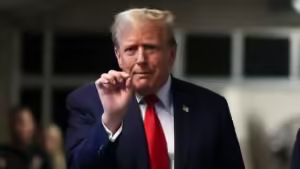
Trump’s Rising Polls Stir Concerns Among Global Finance Leaders at IMF and World Bank Meetings
Amid discussions on low growth, high debt, and escalating global conflicts, a primary concern emerged among finance leaders at the recent International Monetary Fund (IMF) and World Bank meetings in Washington: the potential economic implications of a Donald Trump return to the U.S. presidency in the upcoming election. Trump’s gains in recent polls, which have significantly closed the gap between him and Democratic candidate, Vice President Kamala Harris, fueled discussions among finance officials, central bankers, and civil society representatives.
Concerns ranged from Trump’s plans for massive tariff hikes, potential increases in U.S. debt, and his stance against climate initiatives in favor of fossil fuel production. Bank of Japan Governor Kazuo Ueda noted, “Everyone seemed to worry about the high uncertainty on who would become the next president, and what policies would be taken under the new president.”
Trump has proposed a 10% tariff on imports from all countries and a 60% duty on Chinese imports, measures that could disrupt global supply chains, provoke retaliations, and drive up costs. German Finance Minister Christian Lindner warned that a U.S.-EU trade war would yield “only losers.”
Additionally, Trump’s proposed tax breaks, including extensions of 2017 individual tax cuts and exemptions on income from tips, overtime, and Social Security, are estimated to increase U.S. debt by $7.5 trillion over the next decade, adding to the Congressional Budget Office’s already projected $22 trillion in debt growth by 2034.
In contrast, a Harris victory would likely continue President Joe Biden’s policies favoring multilateral cooperation on climate action, corporate tax reform, debt relief, and development bank reforms. While Harris’s policies might also increase U.S. debt, her proposals are viewed as less inflationary than Trump’s.
Markets React as Trump’s Polling Improves
Financial markets have already begun to reflect Trump’s improved prospects. “Trump trades” — investments in assets like stocks, bitcoin, and the Mexican peso that gained during Trump’s prior administration — have resurfaced. The U.S. dollar recently experienced its largest monthly increase in over two-and-a-half years, rising by 3.6% in October. Standard Chartered analyst Steve Englander attributed 60% of the dollar’s increase to Trump’s resurgence in betting markets.
Brazil’s central bank chief, Roberto Campos Neto, commented that pro-Trump bets were already pushing up long-term interest rates, creating inflationary effects, particularly in dollar-sensitive economies. Both Trump’s and Harris’s fiscal plans are expected to increase inflation, but the immediate impact of Trump’s rise is evident in rate futures and dollar movements.
IMF’s Outlook on Inflation and Debt Concerns
IMF Managing Director Kristalina Georgieva highlighted the potential impact of ongoing high debt levels on global growth, urging policymakers to start reducing COVID-induced debt to avoid a future of low growth and rising public dissatisfaction. When asked how the prospect of a Trump presidency affected discussions, Georgieva emphasized that the IMF’s focus was on identifying current economic challenges rather than speculating on U.S. election outcomes. “Elections are for the American people,” she remarked.
Emerging Market Pressures
Trump’s potential return to office has already raised concerns about U.S. deficits, which could create additional challenges for emerging markets. Turkish Finance Minister Mehmet Simsek noted that a larger U.S. deficit could lead to higher long-term rates and a stronger dollar, both of which pose challenges for emerging markets. South African Central Bank Governor Lesetja Kganyago added that a global tariff war could stall inflationary relief efforts worldwide, making disinflation a tougher task for central banks.
Saudi Arabian Finance Minister Mohammed Al-Jadaan, chair of the IMF’s steering committee, emphasized the importance of maintaining open dialogue, recalling productive cooperation with previous U.S. administrations, including Trump’s. Other finance leaders echoed this sentiment, with Angolan Finance Minister Vera Daves de Sousa calling every challenge “an opportunity to reorganize and learn to deal with it.”
.
#everyday_information #forex #option #Binary_Option #trading #trader #goldstocks #forextrader #fx_trade_time #fxttime #USDollar #euro #JPY #GBP #chfcurrency
#dubai #UAENews #ksasaudiarabia #Syrian #iraq #kuwait #jordan #morocco #Libya #tunisia #algerian #Egypt #qatar #lebanon
#كل_يوم_معلومه #فوركس #خيارات_ثنائيه #تداول_عملات #بورصه #ذهب #فوركس_تريد_تايم #اف_اكس_تريد_تايم #دولار #يورو
#دبي #امارات #السعوديه #سوريا #العراق #الكويت #الاردن #المغرب #ليبيا #تونس #الجزائر #مصر #قطر #لبنان
.
www.fxttime.com/trade